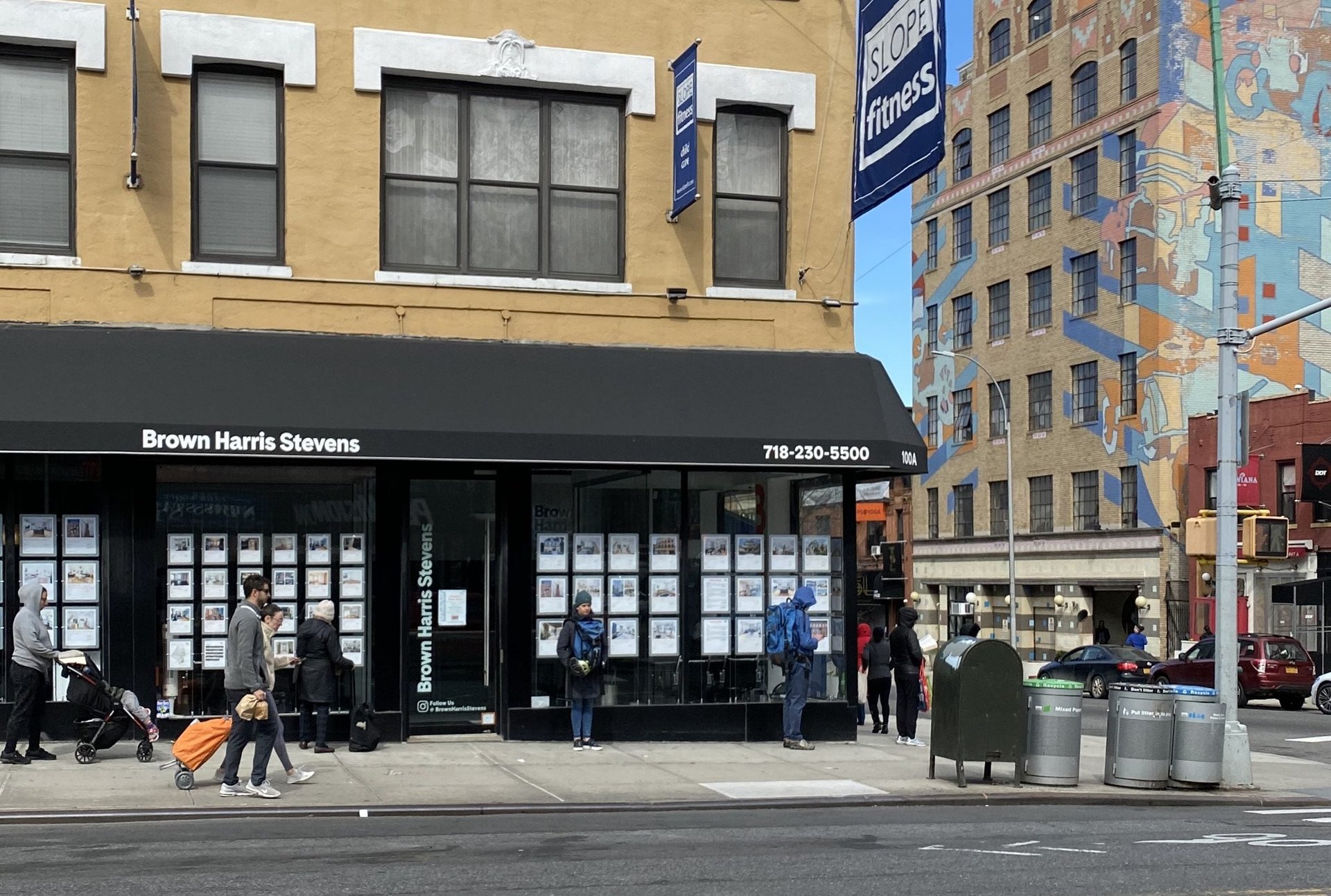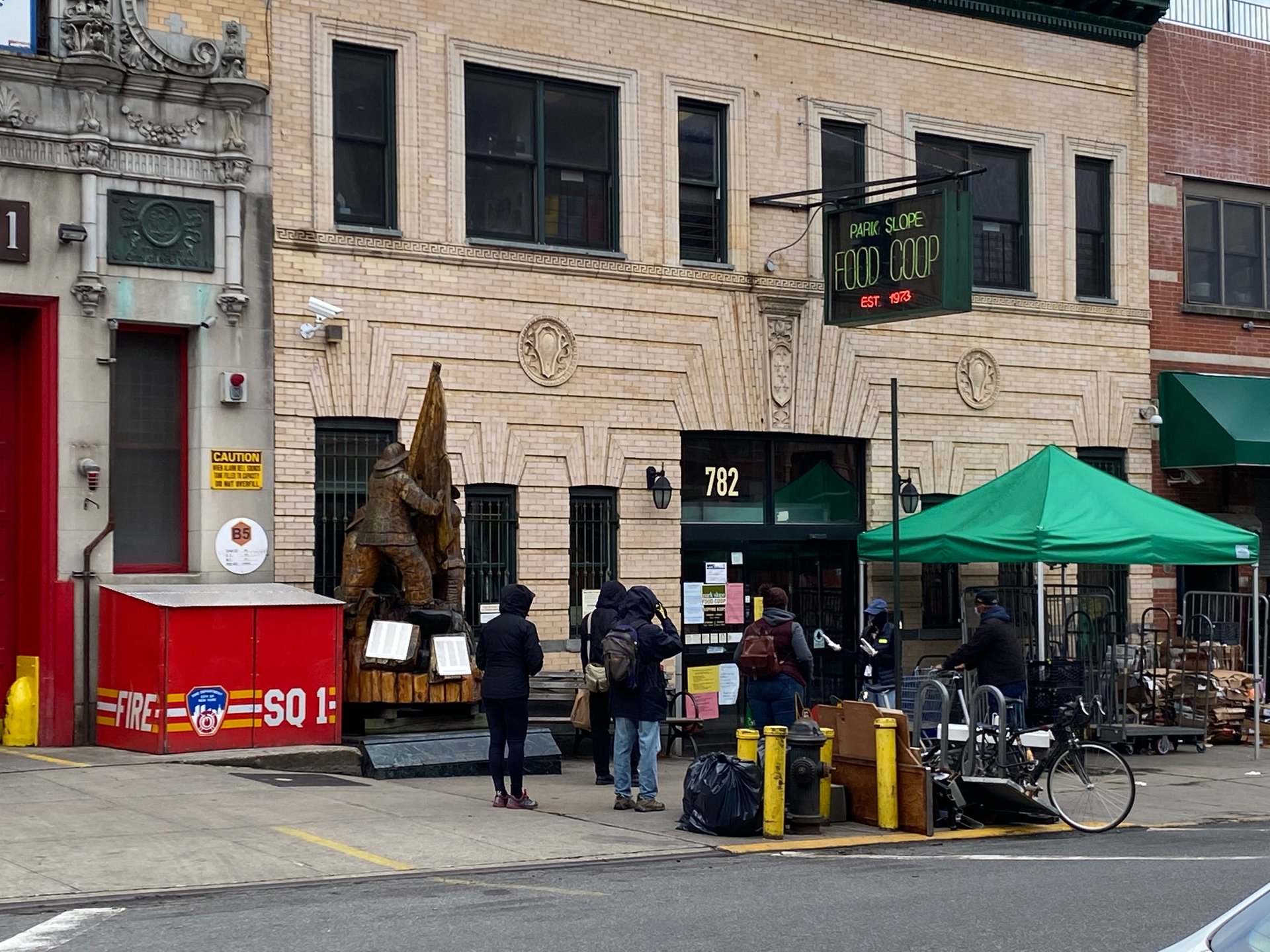Brooklyn’s legendary food co-op shows how community organizations can thrive in a pandemic
Your friendly, local grocery store is a locus for the coronavirus. The once simple and rather pleasurable act of buying food has become a risky chore that tests the patience and prudence of both shoppers and store owners.


Your friendly, local grocery store is a locus for the coronavirus. The once simple and rather pleasurable act of buying food has become a risky chore that tests the patience and prudence of both shoppers and store owners.
In New York City, arguably no other food market mirrors the logistical and emotional toll of this new reality than the Park Slope Food Coop. Brooklyn’s 47-year-old “socialist utopia,” which runs on the sweat-equity of 17,000 “member-workers,” re-engineered its entire operation in a matter of weeks and routinely updates its safety procedures to adapt to the changing nature of the pandemic.

The New Yorker’s Alexandra Schwartz described it best when she wrote that “the noblest aspirations of civilized society versus the base reality of human nature” often comes to a head at the Coop. This drama has never been more apparent, as it is now.
The monster line outside offers a prelude. Like other essential services that remain open, the Coop caps the number of shoppers in the store to comply with social distancing protocols. On weekends, this could mean a two- to four- hour wait, with the line snaking for blocks along the sidewalks of the picturesque Brooklyn neighborhood. Experienced Coop shoppers come with a meticulous shopping list, carrier bags, a face mask, a fully charged phone, a book, maybe a handheld video game, and a folding chair.
“I didn’t realize that it was going to be a four-hour wait,” a member told Quartz. Thinking to avoid the weekend rush, she planned a shopping expedition on a Tuesday in early March. She joined the line about 90 minutes before the Coop opened at 10:30 am. At that point the line was already three city-blocks long. No one dares cut in line because “the Coop will fight you,” as the she puts it.
Just before entering, shoppers get a quick drill: Wipe down the grocery carts, sanitize your hands, don’t crowd the aisles, shop quickly and efficiently. The list of the Coop’s Covid-19 protocols occupies a full page in the March 26 edition of its newsletter. It’s also repeated over the Coop’s infamous loudspeaker throughout the day. These policies constantly evolve too, lately becoming more stringent as New York City braces for the peak of the coronavirus. This week, the Coop experimented with handing shoppers numbered chits to keep better track of how many people are in the store. Before the Centers for Disease Control’s directive about using face coverings last week, the Coop gave away masks to every shopper.
It’s useful to note that there are other grocery stores with no lines or persnickety rules within steps of the Park Slope Food Coop. But members attest that the stock of super fresh and inexpensive goods is worth the agony.
“Once you get in, it’s really nice,” the member said. “The Coop is normally always so crowded and it’s really nice not to jostle other people as you shop. I have never bought that much groceries in my life but I was in and out in 15 minutes tops.”

On busy days, shoppers are asked to follow a specific traffic flow pattern: People who can fit their items in two baskets must start in the produce section, while those buying in bulk are directed to the opposite side of the 6,000 square-foot (560 square meters) store. They’re asked not to touch any items unless they intend to buy it. Shoppers must step away from the cashier when paying, and personal bags must be kept in carts or designated metal baskets and never ever graze the hyper-sanitized check-out counter. On Thursdays, only seniors and those with health conditions that make them more vulnerable to getting the virus are allowed to shop.
The Coop’s most radical health intervention happened on March 23. For the first time since it opened its doors in 1973, the monthly labor requirement for members was suspended. Before the pandemic, anyone who wanted to avail of the range of the bounty of produce, cheap spices, and cheeses had to work a 165-minute shift each month. The participatory-labor model, which has kept prices low, is strictly enforced and anyone who missed a shift had to serve two. Now, the Coop is hiring temporary staff to perform duties members would normally take on, such as receiving deliveries, stocking shelves, and manning check-out counters.
Ann Herpel, the Coop’s general administrator, told Quartz that their decision is meant to protect its permanent staff and shoppers. “We’ve been getting concerned. We saw this at the beginning of March, as people began to buy a lot more.”
Indeed, just when New Yorkers were beginning to understand the gravity of the pandemic, some members feared that the crowded store was becoming a “petri dish for coronavirus.” Apart from the throng of panic-buying preppers, some 250 to 300 shopper-members typically work a shift at the Coop each day, raising the vectors for spreading the disease. By the time of our interview (March 26), Herpel reports that none of the Coop’s paid staff have tested positive for coronavirus, though several employees have been on leave to self-quarantine. Employees don’t have to submit to daily temperature checks like they do at Wal-Mart, Whole Foods, and other retailers, but they do wear protective gear and are hyper-vigilant about social distancing.
Canceling worker shifts was also driven by New York governor Andrew Cuomo’s ban on non-essential work. “We didn’t interpret governor Cuomo’s directive to apply to members” explained Herpel. “We were joking, that if he [Cuomo] found out that there was still some co-op in Brooklyn that was having that many people come out of their house everyday to ‘work,’ he’d probably be very upset with us.”
Of course, the Park Slope Food Coop isn’t just “some co-op.”
Apart from being the most profitable grocery operation in New York, it’s also the largest co-op of its kind in the US. Members not only work and shop there but also have a voice in shaping and enforcing its policies. Even before the pandemic, the Coop was notorious for its epic check-out lines (its newsletter is called The Linewaiters’ Gazette). That may have conditioned members to more readily adjust to the strange new Covid-19 shopping protocols.
With the membership office closed, the Coop’s social media accounts have become its central communications hub. On Instagram, shoppers are encouraged to crowdsource wait times for the lines and share tips on how to shop efficiently. Others use the comments sections to appeal for an appointment system that would, in theory, mitigate the long lines outside. The crazy lines, incidentally, have irked the Coop’s neighbors, who decry the potential Covid-19 carriers loitering outside their windows.
But Herpel explained that the expense of hiring staff and accommodating fewer shoppers has put a big dent in the Coop’s finances, and their immediate priority is to stabilize daily operations and study how the drop in sales impacts the supply system.
On occasion, the Coop uses social media to call out members who violate community rules. Tending to shopping carts is a particularly sticky issue, even before the pandemic. To a cart left on the sidewalk, it said: “Frankly, we have enough to do without chasing around carts. Do we need to keep your ID as collateral for cart return? Suspend membership for failure to return the cart?”
While some members formed a virtual mob to shame the unknown violator, others appealed for kindness. “There is no need to shame people in the name of cooperation. Some of us are literally unable to access the coop at all for foreseeable future and to see a digital prompt that encourages people to pile on feels extra harsh,” a member wrote. “Sometimes, when someone does something that seems careless or inconsiderate, I try to imagine why they might have done it from a place of compassion,” wrote another. “I imagine that this is their worse day, I take a deep breath and send them off with love.”